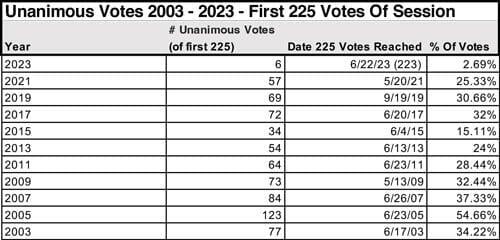LANSING, Mich. (MIRS News) – Only six bills have passed the House with unanimous support so far in 2023, marking a massive decline over the past 10 sessions based on an analysis conducted by MIRS.
A MIRS analysis of House journal voting records from 2003 to 2021, found that of the first 225 roll call votes each odd year starting a term, House members voted unanimously to pass legislation an average of 70 times.
MORE NEWS: America’s Butterflies Are Disappearing
MORE NEWS: GOP Senator: Monroe County Community College Removes ‘Gender-Inclusive’ Restroom Signs
But as of June 23, 2023, the House has taken 223 roll call votes, and only six of them have been unanimous.
Most recently, on Thursday, the House passed two bills with unanimous support. Sen. Erika Geiss (D-Taylor)’s SB 161 and Sen. Sean McCann (D-Kalamazoo)’s SB 162 both passed, 109-0.
Both bills modify requirements allowing out-of-state teachers to obtain a Michigan teaching certificate without additional testing.
Upon their passage, several House members broke into cheers, and Speaker Pro Tempore Laurie Pohutsky (D-Livonia) said, “I’m supposed to tell you not to celebrate, but, whatever.
“Look at us, guys,” she said.
At first, it doesn’t seem like a routine bill package could be cause for so much celebration, but with only six unanimous votes so far this term, complete bipartisan support has been something of a rarity.

MORE NEWS: America’s Butterflies Are Disappearing
MORE NEWS: Paddle Boat Seeks Historical Status
The first unanimous vote didn’t come until April 20, on Rep. Robert Bezotte (R-Howell)’s
HB 4047, a bill designating Feb. 1 of each year as “Blue Star Mothers Day,” honoring the mothers of children in the armed forces.
The bill received a 106-0 vote in favor.
The next to come was Rep. Kelly Breen (D-Novi)’s HB 4121 and Rep. Kara Hope (D-Lansing)’s
HB 4122 on May 24, part of a package permanently revoking the medical licenses of physicians convicted of sexual assault under the pretext of medical treatment.
Both bills passed, 107-0.
On June 20, Hope’s HB 4689 designating a portion of US-127 as the “Trooper Starr Memorial Highway” also passed, 109-0.
But those six bills make up only 2.69% of the total 223 roll call votes so far in 2023. Compared to the previous 10 years, when an average 31.42% of the first 225 votes each term were unanimous, the few votes this year begin to look like anomalies.
That includes 64 unanimous bills in 2011, when Republicans first regained control of the chamber after a Democratic-controlled House in 2010.
Bill Ballenger, editor of the Ballenger Report, said the lower number could be partly due to another change of control in the House, combined with the “incredibly polarized climate that we have nationally, and in Michigan, between the two parties.
“There’s just not as much compromise,” he said.
Ballenger added that it’s the first time since 2010 that Republicans have been the minority party in the House, and “they’re resentful, I think.”
Democrats have crammed a lot down their throats, all sorts of bills of major importance, he said, and it carries over into seemingly ordinary bills that would maybe have gotten unanimous support in the past.
“Republicans are routinely showing that, ‘we’re not going to be nice guys here and just go along with you on everything you want, Democrats, because you’re treating us badly,’” he said, adding that this could be seen as Republicans mounting a resistance.
One example was the vote for House Speaker Joe Tate (D-Detroit), who was elected with a 102-8 vote in favor in January.
Reps. Steve Carra (R-Three Rivers), James DeSana (R-Carleton), Joseph D. Fox (R-Fremont), Neil Friske (R-Charlevoix), Mike Hoadley (R-Au Gres), Matt Maddock (R-Milford), Angela Rigas (R-Alto) and Josh Schriver (R-Oxford) voted no.
Carra, Friske, Maddock and Shriver have frequently been the only Republican no on legislation since, with Rigas also often making a guest appearance, including bills setting 18 as the minimum age of consent for marriage, establishing Juneteenth as a state holiday and allowing students to claim an excused absence if they leave school to play Taps at a military honor funeral.
Maddock said he’d “love to cut taxes and regulations on workers and help families.
“But sadly, Democrats keep pushing insanity like hair discrimination, outlawing marriage and criminalizing churches,” he said. “I look forward to any bill that Democrats write that isn’t pushed by their lunatic fringe.”
But other Democrat-championed bills have received much less bipartisan support during their passage, and Ballenger said that could be attributed to a focus on Democratic priorities with both chambers locked down for the first time in 40 years.
A lot of the legislation majority Democrats are passing out are priorities they know have a chance to make it through the Senate and to the governor’s desk, he said, “and the Republicans can’t do anything about it.
“So they’re taking advantage of that, and they’re ramming through a lot of major legislation that Republicans abhor,” Ballenger said.
He said in previous years, a consistent Republican majority put out legislation that could be analyzed as less “controversial,” at least for Republicans, but a new party in power has given way to new partisan priorities.
Ahead of the anticipated passage of the budget next week, Ballenger said it will be interesting to see if Republicans will change their tone, or continue to feel like Democrats aren’t listening to them and vote accordingly.
The budget is different from a lot of the rest of the bills, he said, because it’s the main thing the Legislature really must do.
